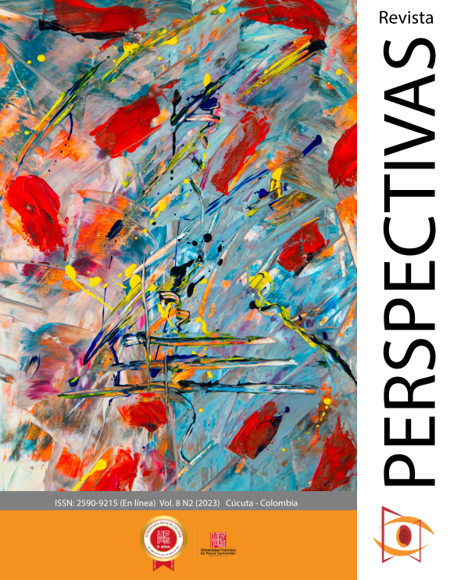Learning Ecosystem in Virtual Education. A Theoretical Contribution For the University Context
Ecosistema de Aprendizaje en la Educación Virtual. un Aporte Teórico para el Contexto Universitario
Main Article Content
The object of the investigation was to build a theoretical framework for the virtual education learning ecosystem in the university context of the Universidad Pedagógica Experimental Libertador (UPEL) - Instituto de Mejoramiento Profesional del Magisterio (IMPM). Methodologically, it begins in the interpretative paradigm based on a qualitative approach with a phenomenological method. The key informants are shaped by teachers and scholars, and are used in the semi-structured interview for the
collection of data. In the results it is found that a basic characteristic of the eco-systems of learning in development is its capacity for self-organization, stands out for its constant adaptation or development of evolution both of the dynamic learning mechanisms and the dynamic learning mechanisms. We are aware that these are separated from each other by its interdependence in virtual education. It is concluded that the learning ecosystem is self-regulating, in this sense, the populations of its living components are growing or are reduced to strategic decisions that are taken in line with the vision and mission of the organization
Downloads
Article Details
rprises (SMEs). 2007 Inaugural IEEE-IES Digital EcoSystems and Technologies Conference, 420-425. https://doi.org/10.1109/DEST.2007.372010 DOI: https://doi.org/10.1109/DEST.2007.372010
Echeverría, J., & González, M. I. (2009). La teoría del actor-red y la tesis de la tecnociencia. Arbor, 185(738), Article 738. https://doi.org/10.3989/arbor.2009.738n1047 DOI: https://doi.org/10.3989/arbor.2009.738n1047
García-Peñalvo, F. J. (2018). Ecosistemas Tecnológicos Universitarios. . . Análisis, 9.
García-Peñalvo, F. J., Hernández, Á., Conde, M. Á., Fidalgo, Á., Sein, M. L., Llorens, F., & Iglesias, S. (2015). Mirando hacia el futuro: Ecosistemas tecnológicos de aprendizaje basados en servicios. Fundación General de la Universidad Politécnica de Madrid. http://rua.ua.es/dspace/handle/10045/51427
Gifre, M., & Guitart, M. (2012). Consideraciones educativas de la perspectiva ecológica de Urie Bronferbrenner. Contextos Educativos. Revista de Educación, 0(15), Article 15. https://doi.org/10.18172/con.656 DOI: https://doi.org/10.18172/con.656
Gómez-Valderrama, C., Hernández, C., & Prada, R. (2020). La zona de posibilidades en el proceso de aprendiencia del residente digital: Un análisis cualitativo en la Red de experiencias Matemáticas de Norte de Santander : Educación y Humanismo, 22(38), Article 38. https://doi.org/10.17081/eduhum.22.38.3688 DOI: https://doi.org/10.17081/eduhum.22.38.3688
Helmy, Y., Nasr, M., & Ouf, S. (2013). A Proposed Model for Using Cloud Computing and Web2.0 in Deploying E-Learning Ecosystem (ELES). International Journal of Cloud Applications and Computing (IJCAC), 3(4), 51-80. https://doi.org/10.4018/ijcac.2013100105 DOI: https://doi.org/10.4018/ijcac.2013100105
Islas, C. (2019). Los ecosistemas de aprendizaje y estudiantes universitarios: Una propuesta de abordaje sistémico. Revista de psicología y ciencias del comportamiento de la Unidad Académica de Ciencias Jurídicas y Sociales, 10(2), 172-186. https://doi.org/10.29059/rpcc.20191126-98
Laanpere, M., Pata, K., Normak, P., & Põldoja, H. (2014). Pedagogy-driven design of digital learning ecosystems. Computer Science and Information Systems, 11(1), 419-442. DOI: https://doi.org/10.2298/CSIS121204015L
León, A. (2007). ¿Qué es la educación? Educere: Revista Venezolana de Educación, 39, 595-604.
Lincoln, Y. S., & Guba, E. G. (2000). Paradigmatic controversies, contradictions, and emerging confluences. In N. K. Denzin, & Y. S. Lincoln (Eds.), The handbook of qualitative research (2nd ed., pp. 1065-1122). Thousand Oaks, CA: Sage Publications.
Martí, R., Gisbert, M., & Larraz, V. (2018). Ecosistemas tecnológicos de aprendizaje y gestión educativa.: Edutec. Revista Electrónica de Tecnología Educativa, 64, Article 64. https://doi.org/10.21556/edutec.2018.64.1025 DOI: https://doi.org/10.21556/edutec.2018.64.1025
Martínez, M. (2004). Ciencia y arte en la metodología cualitativa. Editorial Trillas. S. A. de C. V.
Nguyen, N., & Hung, N. M. (2013). On the Procedural Structure of Learning Ecosystem Toward Competency Learning Model (SSRN Scholarly Paper 2481764). https://doi.org/10.2139/ssrn.2481764 DOI: https://doi.org/10.2139/ssrn.2481764
Pata, K. (2011). Meta-design framework for open learning ecosystems. Mash-UP Personal Learning Environments (MUP/PLE 2011), London, UK. http://tihane. Wordpress. Com/2011/06/09/meta-design-framework-for-open-learningecosystems-at-mupple-lecture-series.
Peñalvo García, J. (2016). En clave de innovación educativa. Construyendo el nuevo ecosistema de aprendizaje. https://gredos.usal.es/handle/10366/131866
Põldoja, H. (2016). The Structure and Components for the Open Education Ecosystem—Constructive Design Research of Online Learning Tools. Doctoral Dissertations.. Aalto University. https://aaltodoc.aalto.fi/handle/123456789/23535
Reyna, J. (2011). Digital Teaching and Learning Ecosystem (DTLE): A Theoretical Approach for Online Learning Environments. In Proceedings of ASCILITE - Australian Society for Computers in Learning in Tertiary Education Annual Conference. 1083-1088. https://www.learntechlib.org/p/43659/
Ricoy, C. (2006). Contribución sobre los paradigmas de investigación. Educação, 31(1), 11-22.
Roque, M. (2011). Hacia el pensamiento ecologizado: Entrevista a Edgar Morin. Quaderns de la Mediterrània = Cuadernos del Mediterráneo, 16, 268-272.
Wilkinson, D. L. (2002). The Intersection of Learning Architecture and Instructional Design in e-Learning. undefined. /paper/The-Intersection-of-Learning-Architecture-and-in-Wilkinson/029f95567b572a46bc31cead2ee9789692402108







